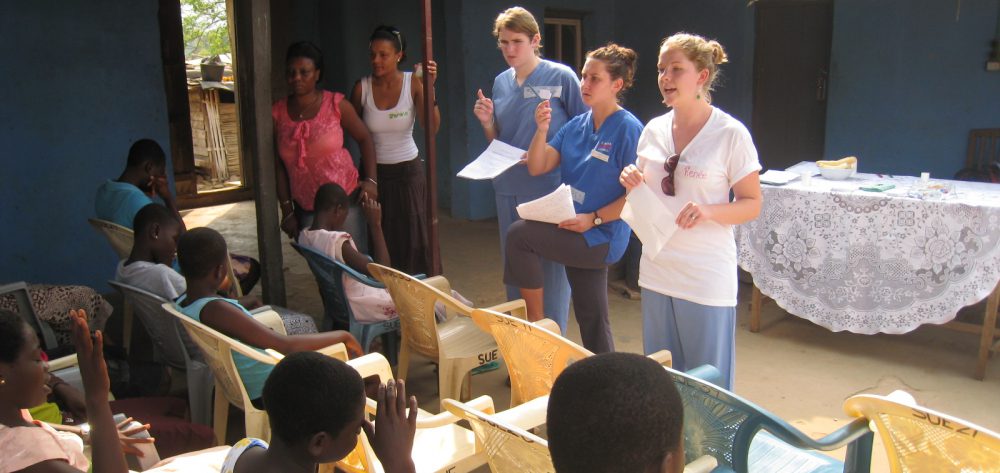Today we are schedule to go to Nkonya. This is the village that I fell at last year and suffered a nasty abrasion to my leg. It took a few months for the scar to go away but I remember that village very distinctly. It is extremely poor and has no source of regular medical care. There is a clinic that is almost completed but the government does not have the money to support staffing and supplies.
Today we are doing some preliminary work in preparation for our HIV education program and testing that will happen tomorrow. Every action we take seems to require a lot of preliminary work before we can begin. We must make our introduction to the community.
There is a funeral happening to day. The town is very active with families dressed in black and red (traditional colors for funerals). We break into 4 teams and the students are advised to give out condoms and any related teaching to the men and women and young adults that have questions regarding the condom use. We have been told that this community has a very high incidence of HIV. Because of the poverty many of the young girls are lured into being sex workers and often acquire HIV. They bring these diseases home to their community and then infect the men there.
There continues to be a huge social stigma for HIV. People do not want to know if they are HIV positive because once you are a known HIV infected person you are shunned from the community. It is not just you who suffers but your whole family suffers from the stigma. So what happens is that people refuse to be tested and often if positive will refuse treatment. Last year we conducted an HIV testing clinic and one woman was found to be positive I was the one who had to tell her that she was positive. I have learned today that she refused to acknowledge her diagnosis and would not take the antiretroviral medications. She is dead now for a few months. I recall her as a middle age woman with no other medical issues.
The UML students last year did an HIV program for the youth and this year’s students will be doing a similar program. It is hope that if we educate the youth then they may be more likely to engage in healthier behaviors but also serve as advocates for the people in their community.
I am lead by Patrick who remembers me from last year. He is a community leader and all of our negotiations have to go through him. He has also informed me that another patient that I told had likely advanced breast cancer last year has died. There is no such thing as regular mammograms for the women in this region. I am a bit heartened to hear that one of the patients that I saw last year with an enormous rectocele has been seen by a physician and she is much better. I don’t think she had surgery but she is in front of me and appears well. He tells me that she was inspired to see the doctor at the hospital because I told her to go.
We break into 4 teams and go into the village to distribute condoms and check BP. At every home they are desperate for any thing you can give them. I have some Tylenol, Motrin and vitamins that I give out if necessary. Even if they have no pain or hypertension they want medication. This is a real big problem here. They want to take the pills short term to solve the problems but are not willing to make the long term lifestyle and sanitation changes that need to be made for overall improvement in their health. It can be discouraging to see so much need and to realize that we are only making a very small dent in their existence.
Patrick has many needs and wants me to help him find a medical provider that will stay and work in their clinic. I struggle with the notion of foreign countries providing aid to these people when their own government needs to make sweeping changes to ensure that there are personnel and supplies available to provide care. I am taken from home to home to home and the story and the people are the same. We are supposed to meet with the chiefs but I don’t believe that will happen. They have had a big funeral today and many of them are at that ceremony.
As word gets out in the village that nurses are in town the number of patients amazingly increases about 10 fold. At every corner there is a cluster of patients wanted some of this ‘free medical care.’ At one point we have to physically be directed to our awaiting Tro tro to go home. Tomorrow we return to Nknonya for the HIV program and another stationary BP clinic. I am dreading that day because I remember last year and it was a mob scene.
